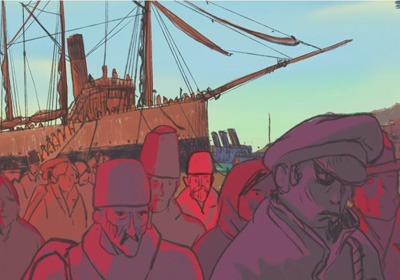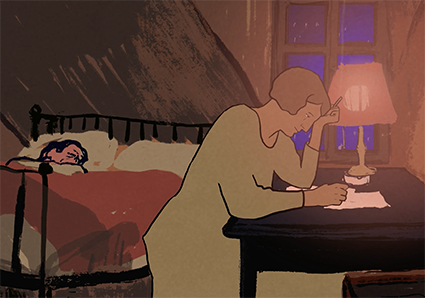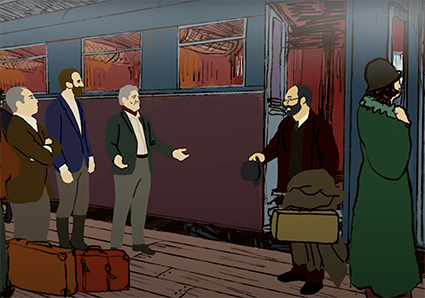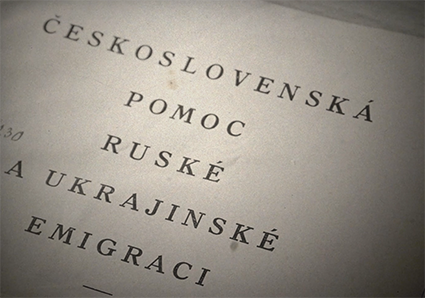The project responds to one of the most pressing issues (not only) of the 21st century – that is, the phenomenon of migration and related topics. The aim is to show that migration is not just a matter of humanitarian aid or a potential security risk. Using past examples, the research team intends to demonstrate that migration can be understood as a mutually enriching process, from both the perspective of the newcomers and the society that receives them.
The project is primarily based on research into the Russian emigration in interwar Europe. The focus is on the study of key figures in the history of the 20th century, namely emigrant intellectuals who left Russia as a result of the civil war and the Bolshevik revolution in 1917. Emphasis is placed on their contribution to European society in the fields of science and culture.
Special attention is paid to the situation in Czechoslovakia in the 1920s, when the government, through the so-called Russian relief action, invited intellectuals and students from the ranks of refugees from Bolshevik Russia and offered them the opportunity to continue their studies or scientific and cultural activities. The “Czechoslovak Way”, i.e. the active support of selected emigrants, draws attention to the cultural and social benefits that an open approach to the issue of migration can bring.
In 2020, in response to the COVID-19 pandemic, the project was extended to include border closures and quarantine measures in the 20th century, which painfully affected migrants. In the context of public health rules, state borders have become obstacles to the development of science and creativity, which could often be politically abused.
The project wishes to open a debate on the phenomenon of migration in modern history with the help of audiovisual and textual materials. In addition to scientific research, a large part of the project is also devoted to the communication of scientific outputs to the general public through documentary and animated films and public lectures. The results of the research will also be transferred to the curriculum for secondary schools.
The main outputs of the project – scholarly studies and articles, public lectures and discussions, as well as comic books and documentaries – therefore try to grasp the phenomenon of migration in its complexity, from traumas associated with fleeing the homeland and difficult life paths to issues related to troublesome and often unexpectedly enriching integration.
Zuzana Urbanová, Michaela Kolářová, Berta Skalíková, Paulína Horváthová, Kateřina Jůzlová, Ivana Rapoš Božič, Jan Krotký, Helena Konečná
TL02000495-V8





TL02000495-V1
Celý film bude k zhlédnutí od 1. ledna 2024.

TL02000495-V18
Promítání filmu: 30. března 2023, v brněnském kině Scala.
The programme focuses on the period of the First Republic and the question of the reception of refugees from the former Tsarist Russia. It is based on a critical examination of contemporary newspaper articles that speak (both positively and negatively) about the emigrants. In this way, it indirectly raises the currently very sensitive topic of emigration, but the intention is not to debate the current situation, but to reveal the (recurrent) ways in which the topic is treated in the public space. The programme is scheduled for three lessons, involving the following activities: 1. screening of the documentary film Refugees and Czechoslovakia in 1918–1948. Russian Action (25 minutes); 2. a game with a timeline and cards representing key historical events; 3. a summary of the information presented in the game; 4. a demonstration of how to read a text critically using a selected newspaper article as an example; 5. work with contemporary articles in pairs and groups; 6. a moderated discussion of the texts; 7. feedback.
Materials for download
Ivan Foletti, Karolina Foletti & Adrien Palladino
TL02000495-V17
překlad Lucie Dlouhá & Karolina Foletti
TL02000495-V19
Budoucí básnířka, čtrnáctiletá Irina Knorring opustila Ruskou říši v listopadu 1920 na jedné z 126 lodí, které odvážely zbytky Bílé armády z Krymu. Psaní deníku jí bylo útěchou a radostí na složité cestě do exilu. I přes těžkosti, které popisuje, nejsou však její zápisky drásavé. Působí prostě a bezprostředně, jako rozprávění s blízkým člověkem. Dnes její deník představuje nejen osobní příběh mladé dívky z Charkova, ale nabízí též bezprostřední vhled do doby minulé a nastavuje zrcadlo době naší.
Irène Némirovsky
* Kniha vyšla s finanční podporou Státního fondu kultury České republiky, úvod napsán za podpory TA ČR
V krátkém, čechovovsky laděném románu Podzimní mouchy autorka vykresluje úpadek ruské rodiny Karinových, které se ve vřavě revoluce zhroutí svět. Karinovi prchající před bolševiky se uchýlí do Francie a v rodinném sídle ponechají jen starou věrnou chůvu Taťánu Ivanovnu. Nakonec se i ona vydává v jejich stopách a opouští domov, který bolševický režim nadobro zničil. Irène Némirovsky vypráví s citem a bez přehnaného patosu příběh o lidech, kteří zažívají konec jedné éry a bolest ze ztráty domova i těch, které tolik milovali. Stárnoucí chůva je ochránkyní vzpomínek na staré Rusko, které v emigraci slábnou a rozpouští se v neustálých starostech o živobytí. S její smrtí odchází i starý svět. Ačkoliv se z hrdinů ve chvílích beznaděje stávají malátné a unavené podzimní mouchy, které […] vyčerpaně a podrážděně poletují, narážejí do oken a táhnou za sebou polomrtvá křídla“, nakonec i oni docházejí k trpkému smíření s novou každodenností. Rozsah knihy připomíná, že silného účinku lze dosáhnout i nemnoha slovy. Jediné, co se dá románu totiž vytknout, je, že ho přečtete tak rychle. Nejspíš na jeden zátah.
TL02000495-V14
The panel exhibition dedicated to Russian emigrants from Tsarist Russia includes fifteen information panels and is divided into three thematic areas: the first focuses on the so-called Russian Action and the attitude of the Czechoslovak government and society towards Russian emigrants; the second presents the lives of the students of the Russian high school in Moravská Třebová; and the third one is devoted to the stories of individual figures: the poet Irina Knorring, the writer Irène Némirovsky, and the journalist Hélène Iswolsky.
We are happy to provide the panel exhibition free of charge to high schools and cultural institutions. If you are interested, please contact anna.kelblova@phil.muni.cz, with “Panel exhibition – loan” in the subject line.
For a detailed view of the panels, click HERE

The lecture focused on the way in which medical care and quarantine measures become a tool of political control and exclusion in times of pandemic. The case of interwar emigrants was used to show how much the medicalization of society cannot be perceived only as the protection of public health. A short animated film subsequently introduced the life path of the Russian art historian Nikodim Pavlovich Kondakov, who emigrated to Czechoslovakia in the early 1920s.

Despite the unstable economic and political situation after the establishment of Czechoslovakia, the two most powerful men in the country, Prime Minister Karel Kramář and President T. G. Masaryk, decide to take an incredible step: they open the borders to Russian students and intellectuals fleeing the Bolshevik Revolution. Thanks to this generous initiative, the true elites of the Russian nation, and amongst them the world’s leading byzantologists, came to Czechoslovakia in the period of the First Republic. Although most of them decided to leave in the light of later events, their presence and activities transformed Prague into a capital of Byzantine studies, renowned in international academic circles.

TL02000495-V21
The debate took place as part of the Knihex Festival in December 2022. Ivan Foletti presented his book The Potential of Migration: Borders, Quarantines and the Fates of Interwar Refugees and addressed questions about the impact of border closures and quarantine measures in the interwar period.
TL02000495-V14

The programme “The Potential of Migration. The Fates of Interwar Refugees” took place on 30 November 2022 at the University Cinema Scala. The audience watched the documentary film Refugees and Czechoslovakia in 1918-1948. Russian Action and the animated films Exile and Hope. Besides, the audience could listen to the poetry of the Russian emigrant Irina Knorring, see part of the panel exhibition and look in the books produced within the project.

The programme took place on 30 March 2023 at the University Cinema Scala. It included, among other things, the documentary film Hope beyond the Sea. Constantinople, Refugees and Quarantines 1917-1922 and the animated films Exile, Hope and Return.